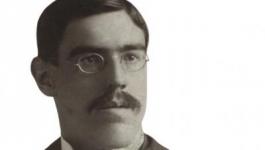Percy Hughes Award

We are pleased to announce the 2024 call for nominations for the Percy Hughes Award for Scholarship, Humanity, and Social Change.
Percy Hughes was a philosopher, teacher, and professor who directed the Philosophy, Education, and Psychology Department at Lehigh University beginning in 1907 until 1942. Over the course of his 35-year tenure at Lehigh, Hughes used the responsibility of scholarship to pursue social change and transform the Lehigh culture. By committing himself to interdisciplinary work and humanistic principles, he furthered Lehigh’s tradition of scientific and classical education. From encouraging curriculum reform for engineers to campaigning against compulsory chapel attendance, Hughes worked tirelessly to transform Lehigh on an educational level. From women’s rights to environmentalism, Hughes devoted his life to historically progressive ideas. Hughes personified and advanced Lehigh’s motto – Homo minister et interpres naturae (man, servant and interpreter of nature) – throughout his career at Lehigh.
The Percy Hughes Award recognizes those who advance Lehigh University's culture of addressing the world's most pressing challenges with sleeves rolled up and an orientation towards real world issues. Award recipients are leaders who not only foster Lehigh's historic educational mission, values, and core beliefs but also push Lehigh in new directions and heights of excellence. The recipient shall be a Lehigh University faculty member, staff member, or student (either graduate or undergraduate in good standing) who works towards implementing large, transformative ideas in the local, national, and world communities with grace, tenacity, and devotion.
The award covers the calendar year prior to its being awarded. For example, the 2024 award will recognize accomplishments in January-December of 2023.
Nominations may be submitted by current students, faculty or staff across all of the departments in the five colleges.Self-nominations will not be considered. Nominators should clearly describe how the nominee demonstrates the following four characteristics and behaviors:
- Positive orientation: Committed to improving Lehigh and/or the broader communities (whether at the local, national, or global level).
- Visible impact: Has a noticeable effect on Lehigh and/or the broader communities.
- Innovative and/or transformative vision: Whether within Lehigh or in broader communities, contributes to enhancing current processes or helping to formulate new approaches and processes, or to helping others come to understand and support a transformative vision of how to move from where we are now to a state more in keeping with the spirit of Lehigh University.
- Positive interpersonal characteristics: Demonstrates respect for all with whom he/she deals, demonstrates persistence when/if facing a setback, and honors both similarities and differences within and across communities.
Nominations must be submitted by May 1, 2024 at 5pm via email sent to Robin Hojnoski, Associate Dean of Graduate Studies, at roh206@lehigh.edu. All individuals will be notified of their nomination for the award. The selection committee shall select a single recipient, although co-recipients may be selected when the committee finds it impossible to identify a single, most-deserving recipient. The recipient will receive $5,000, in which half will be donated to a charity of their choice, and they will have their names engraved on the Percy Hughes Award plaque. The name of each year’s recipient(s) will be engraved on a publicly posted institutional plaque listing all previous recipients, and the accomplishments of the recipient(s) will be described and posted on the College of Education’s website.
The Past Award Recipient.
Dr. William Hunter, 2019/20: Dr. Hunter is an experiential educator who has worked in a variety of internationally focused capacities at Lehigh University for 21 years. He is the founder and Director of the Lehigh University / United Nations Partnership and is also the Director of the Office of Fellowship Advising. Some highlights of his efforts include establishing Lehigh as the 6th university in the world to attain United Nations Non-Governmental Organizations (NGO) certification, creating the Ambassadorial Speaker Series (hosting the Iraqi, Afghani, Palestinian, Pakistani, Korean, Israeli, and Sudanese Ambassadors to the United Nations), the creation of more than 800 internationally focused educational, cultural and social programs for the Lehigh community, developer of Lehigh’s first International Community Service Trip (to Antigua & Barbuda) and service as a Guide and Project Mentor for several years in the Global Village for Future Leaders of Business and Industry. He is credited with developing the world’s first NGO Youth Representative program for the United Nations and recently completed a two-year term as an elected Director of the UN’s NGO Executive Committee. In recognition of his groundbreaking research on global competence, Dr. Hunter was nominated as a Chronicle of Higher Education “Rising Star in International Education.” He has also been honored as Pennsylvania’s “Outstanding International Educator.”
More about Percy Hughes: